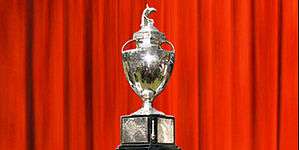1941–42 Ranji Trophy
The 1941–42 Ranji Trophy was the eighth season of the Ranji Trophy. Bombay regained the title after six years defeating Mysore.
 The Ranji Trophy, which the winners get. | |
| Administrator(s) | BCCI |
|---|---|
| Cricket format | First-class cricket |
| Tournament format(s) | Knockout |
| Champions | Bombay |
| Participants | 18 |
| Matches played | 17 |
| Most runs | K.C. Ibrahim (Bombay) (469)[1] |
| Most wickets | B. K. Garudachar (Mysore) (34)[2] |
Highlights
- M. G. Vijayasarathi who umpired in the semifinal and final in 1940–41 played for Mysore in the semifinal and final in 1941–42. His son M. V. Nagendra umpired in the 1968–69, 1970–71 and 1971–72 finals.
- A. G. Ram Singh took his 100th Ranji wicket in the match between Madras and Hyderabad and completed 1,000 runs in the next match between Madras and United Provinces. He was the second player to complete this double in Ranji Trophy after Amar Singh in 1939–40
- Northern India defeated North West Frontier Province by an innings and 405 runs. It was the biggest margin of win in Ranji Trophy at the time. The present record is innings and 472 runs by Assam v Tripura in 1991/92.
- In their first innings of the season, the defending champion Maharashtra was bowled out for 39 by Nawanagar with Shute Banerjee taking 8 wickets for 25 runs.
- Future Test cricketer Putu Chowdhury took 11 wickets on his first class debut, for Bihar v Bengal. Bihar lost the match on a first innings deficit of 1 run.
- Madhav Mantri, making his debut as wicket-keeper for Bombay in semifinal, claimed 9 wickets, including five stumpings.[3]
Zonal Matches
West Zone
| Round 1 | Round 2 | Round 3 | ||||||||
| 15 Nov 1941 – Jamnagar | ||||||||||
| Nawanagar | 159 & 73/2 | |||||||||
| 29 Nov 1941 – Jamnagar | ||||||||||
| Maharashtra | 39 & 189 | |||||||||
| Nawanagar | 284 & 48/2 | |||||||||
| 8 Nov 1941 – Bombay | ||||||||||
| Bombay | 462/8d | |||||||||
| Bombay | 462 | |||||||||
| 29 Dec 1941 – Bombay | ||||||||||
| Western India | 95 & 167 | |||||||||
| Bombay | 405 | |||||||||
| Sind | 326 | |||||||||
| 6 Dec 1941 – Karachi | ||||||||||
| Sind | 237 & 68/2 | |||||||||
| 8 Nov 1941 – Baroda | ||||||||||
| Baroda | 178 & 126 | |||||||||
| Baroda | 312 & 257/6d | |||||||||
| Gujarat | 150 & 23/2 | |||||||||
East Zone
| Round 1 | Round 2 | |||||
| 8 Nov 1941 – Indore | ||||||
| Holkar | 246 & 169/3 | |||||
| 10 Jan 1942 – Benaras | ||||||
| United Provinces | 307 & 192 | |||||
| United Provinces | 426 | |||||
| 7 Dec 1941— Jamshedpur | ||||||
| Bengal | 473 | |||||
| Bihar | 262 & 37/1 | |||||
| Bengal | 263 & 294 | |||||
South Zone
| Round 1 | Round 2 | |||||
| 29 Nov 1941 – Bangalore | ||||||
| Mysore | 199 & 352 | |||||
| 31 Dec 1941 – Bangalore | ||||||
| Hyderabad | 169 & 271 | |||||
| Mysore | 147 & 246 | |||||
| 29 Nov 1941 – Nagpur | ||||||
| Madras | 154 & 217 | |||||
| Central Provinces and Berar | 192 & 128 | |||||
| Madras | 217 & 104/6 | |||||
North Zone
| Round 1 | Round 2 | |||||
| 6 Dec 1941 – Lahore | ||||||
| Northern India | 613/7d | |||||
| 6 Dec 1941 – Lahore | ||||||
| North West Frontier Province | 90 & 118 | |||||
| Northern India | 285 & 128 | |||||
| Southern Punjab | 158 & 181 | |||||
Inter-Zonal Knockout Stage
| Semi-finals | Final | |||||
| 13 Feb 1942 - Lahore | ||||||
| Northern India | 211 & 225 | |||||
| 7 Mar 1942 – Bombay | ||||||
| Bombay | 257 & 184/3 | |||||
| Bombay | 506/9d | |||||
| 31 Jan 1942 – Calcutta | ||||||
| Mysore | 68 & 157 | |||||
| Bengal | 279 & 219 | |||||
| Mysore | 307 & 208 | |||||
2nd Semi-final
13–16 February 1942 Scorecard |
Northern India (H) |
v |
|
Scorecards and averages
gollark: For Haskell, maybe incomprehensible algorithms, weird custom operators, functional purity and not doing anything, sort of thing.
gollark: Do Haskell and some ML-family language?
gollark: Its non-strict-equality operator is *interesting*, yes.
gollark: Memory leaks.
gollark: We need another one!
References
- "Ranji Trophy, 1941/42 / Records / Most runs". Retrieved 23 August 2014.
- "Ranji Trophy, 1941/42 / Records / Most wickets". Retrieved 23 August 2014.
- Bombay v Northern India
External links
This article is issued from Wikipedia. The text is licensed under Creative Commons - Attribution - Sharealike. Additional terms may apply for the media files.